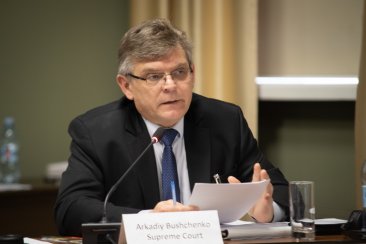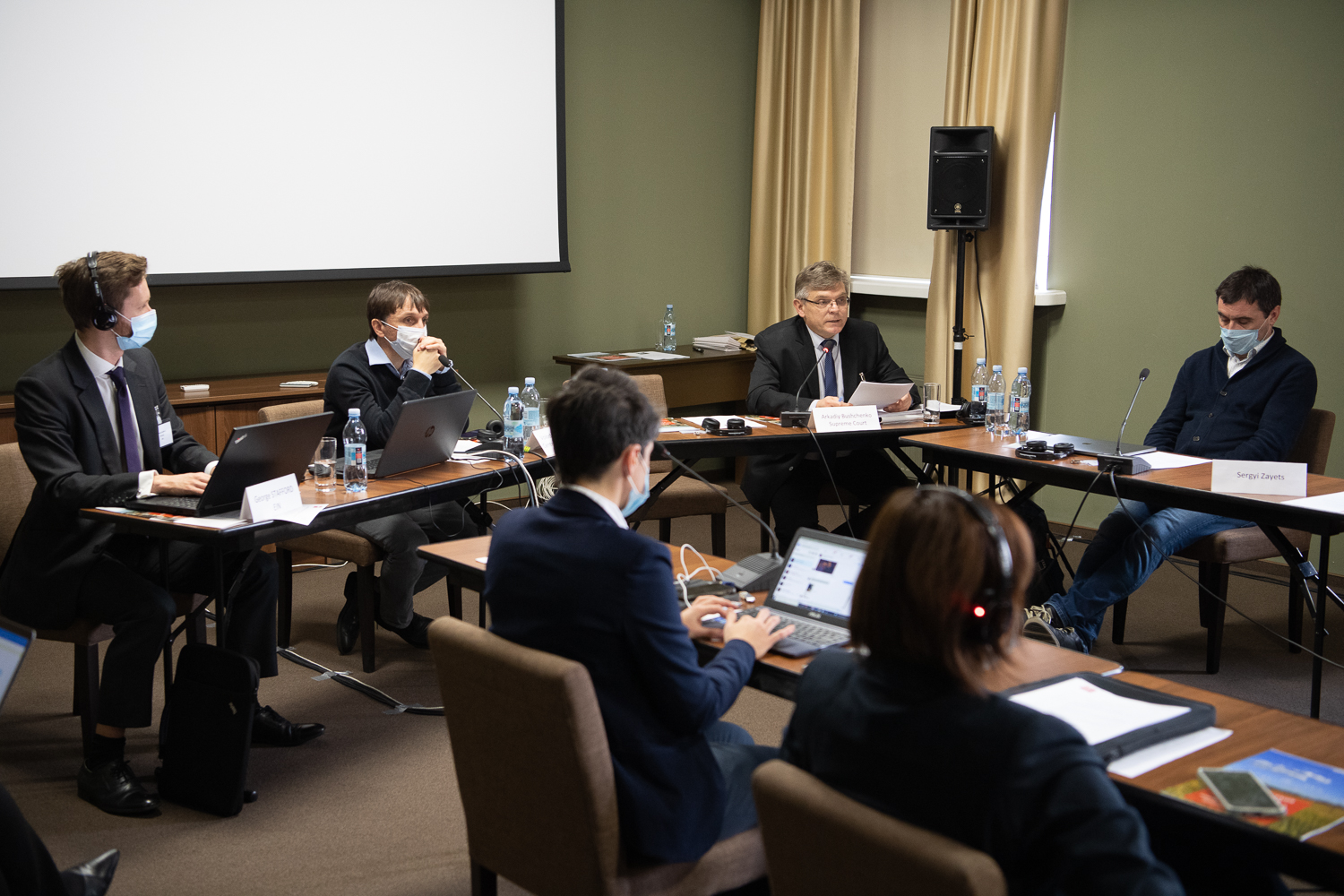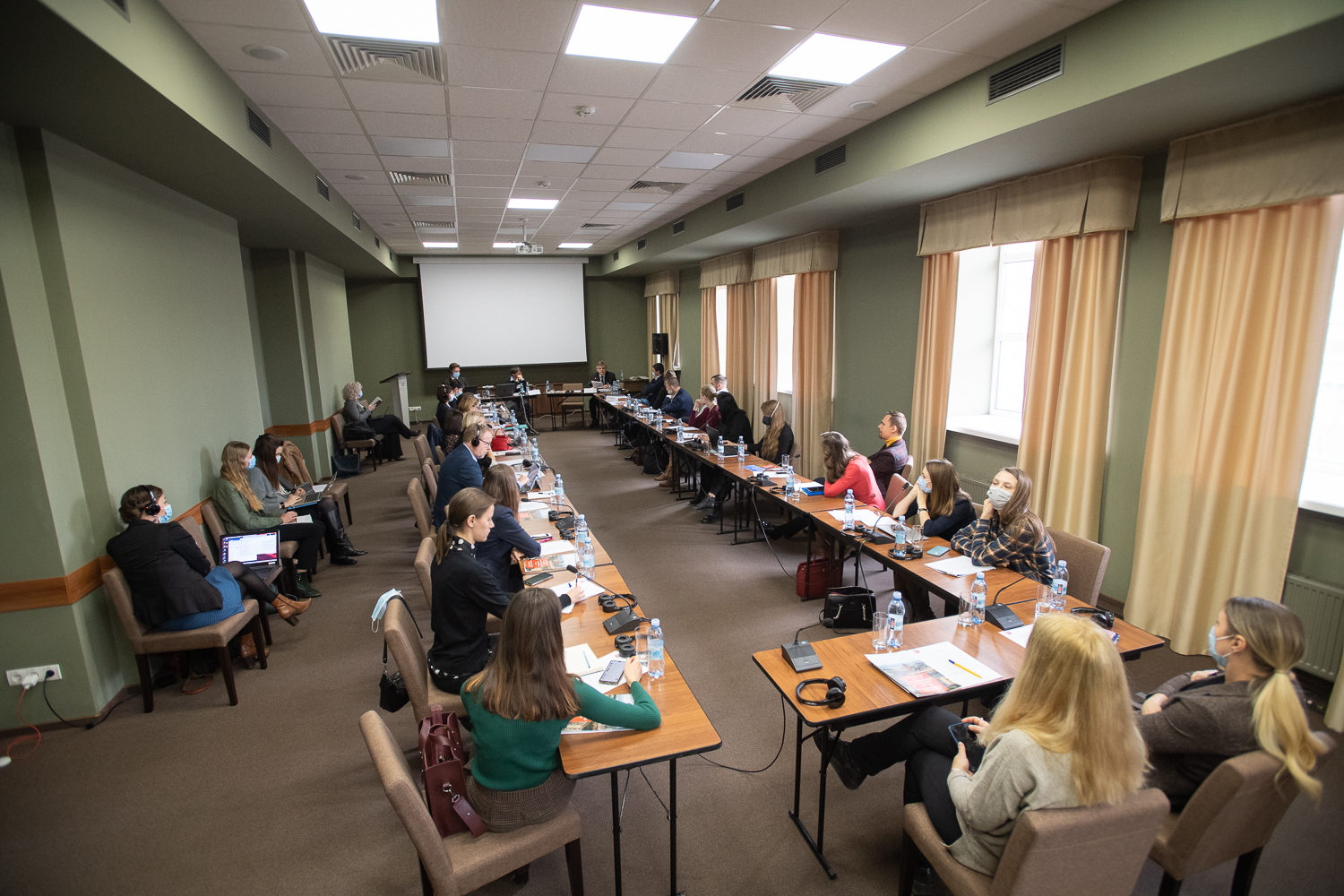Contact center of the Ukrainian Judiciary 044 207-35-46

Arkadii Bushchenko, Judge of the Criminal Cassation Court within the Supreme Court, addressed the Conference on the Implementation of Judgments of the European Court of Human Rights in Ukraine, organized on October 28, 2021 by the European Network for the Implementation of ECtHR Decisions and the Netherlands Helsinki Committee. He gave an account of the Supreme Court's case law on reviewing decisions of national courts on the basis of ECtHR judgments.
At the beginning of his speech, Arkadii Bushchenko spoke about the reasons for the refusal of the Grand Chamber of the Supreme Court to review the decisions of national courts after the judgment of the European Court of Human Rights. According to the decisions, applicants sometimes miss the deadline to apply to the Supreme Court. For example, one of the companies that received the ECtHR's judgment in its favor applied for a review only after four years, which can hardly be considered justified. There are also cases when the applicant submits an application with certain shortcomings and does not respond to the request of the Supreme Court to eliminate the shortcomings.
The speaker noted that a large number of applications to the Supreme Court began to arrive after the judgment of the European Court of Human Rights of October 12, 2017 in the case of Burmych and Others v. Ukraine, which concerned non-enforcement of court decisions. Given the nature of this decision, the Supreme Court could not intervene in this situation, but the Court had to explain for several months in its rulings the reasons for the refusal to initiate proceedings.
In its judgment of March 12, 2019 in the case of Petukhov v. Ukraine (No. 2), the ECtHR found a violation of the Convention for the Protection of Human Rights and Fundamental Freedoms due to the impossibility of reducing the life sentence. Arkadii Bushchenko stressed that many life-term prisoners applied to the Supreme Court with a request to review their sentences on the basis of this judgment, but they were refused.
"There is a strong idea: if you have received any decision of the European Court of Human Rights, you can apply to the Supreme Court and your decision will be reconsidered. That is not true. And the explanation of such nuances takes away significant resources of the Supreme Court," the judge of the Criminal Cassation Court within the Supreme Court said.
Arkadii Bushchenko noted that a certain problem is the refusal to review court decisions if violations were established not by the ECHR, but by another international institution. In one of the cases, the violation of Art. 14 of the International Covenant on Civil and Political Rights (analogous to Article 6 of the Convention for the Protection of Human Rights and Fundamental Freedoms) was established in the observations of the UN Human Rights Committee. The Supreme Court refused to review the decisions of the domestic courts on the ground that it did not consider the Committee's observations to be a judicial decision within the meaning of procedural law. "In my opinion, it will be necessary to return to this issue," the speaker said.

He also drew attention to the fact that, in accordance with the current legislation, the judgment of the ECtHR was actually the only opportunity for a person to achieve a review of court decisions. On the one hand, this increases the role of the ECtHR decision in national doctrine. But on the other hand, there is no way to prevent the judgment of the European Court of Human Rights and restore justice without bringing the case to the European institution.
Arkadii Bushchenko devoted the second part of his report to cases which had been reviewed following the judgment of the ECtHR.
The case of Rostovtsev v. Ukraine concerned a violation of the right to appeal in summary proceedings. Following the judgment of the European Court of Human Rights, the decisions of the courts of Ukraine were overturned by the Supreme Court, and the case was remanded for a new hearing. The decisions of the courts, which became the subject of the ECtHR's decision in the case of Lazarenko and Others v. Ukraine, in which the ECtHR found a violation of the right to participate in the trial, were also overturned. The violation of the right to question a witness and the principle of impartiality of the court was established by the ECtHR in the judgment in the case of Rudnichenko v. Ukraine, the Supreme Court overturned the decision in this case and remanded the case for a new hearing.
The speaker paid special attention to the judgments of the ECtHR in the cases of Sitnevsky and Tchaikovsky v. Ukraine and Zakshevsky v. Ukraine, which concern one criminal case in national courts. Decisions on these persons were partially overturned and remanded for a new hearing, and citizens Sitnevsky and Zakshevsky, previously sentenced to life imprisonment, were released from custody in the Supreme Court courtroom, which caused a stir in the domestic media.
The Grand Chamber of the Supreme Court also overturned the decisions of national courts concerning protesters in the Gorky Park in Kharkiv, following the judgment of the European Court of Human Rights in their favor. These proceedings were closed for lack of corpus delicti.
According to Arkadii Bushchenko, the debate not only in the Supreme Court but also in the ECtHR is caused by the issue of evidence, including the removal of references to certain evidence from court decisions (for example, data of voluntary surrender, records of the reproduction of the situation and circumstances of events, records of interrogations, records of confrontations, etc.) and leaving the court decisions unchanged, given that this evidence does not affect the sentence. Can the removal of references to certain evidence from the sentence and leaving this sentence unchanged be considered a redressing of the injustice of the criminal proceedings? An internal discussion on this issue is underway in court. Some judges are inclined to believe that such injustices can only be remedied by overturning court decisions and remanding the case for a new hearing. Others consider it possible to confine themselves to declaring the evidence inadmissible, but to uphold the judgments, taking into account other evidence in the case. The speaker expressed hope that over time the Supreme Court would find a balance in this matter.
In summary, the judge noted that the Supreme Court made every effort to ensure that its decisions were not criticized by the ECtHR, and assured that the case law of the ECtHR and the interpretation of the Convention for the Protection of Human Rights and Fundamental Freedoms were important elements of the Supreme Court's discussions.
